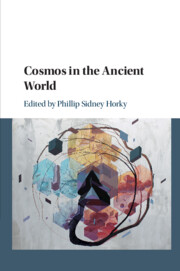Book contents
- Cosmos in the Ancient World
- Cosmos in the Ancient World
- Copyright page
- Dedication
- Epigraph
- Contents
- Contributors
- Acknowledgements
- An Historical Note on Kόσμος – Terminology
- Abbreviations
- Introduction
- Chapter 1 When Did Kosmos Become the Kosmos?
- Chapter 2 Ordering the Universe in Speech
- Chapter 3 Diakosmêsis
- Chapter 4 Aristotle on Kosmos and Kosmoi
- Chapter 5 Order and Orderliness
- Chapter 6 Polis as Kosmos in Plato’s Laws
- Chapter 7 Relating to the World, Encountering the Other
- Chapter 8 Tradition and Innovation in the Kosmos–Polis Analogy
- Chapter 9 Cosmic Choruses
- Chapter 10 All the World’s a Stage
- Chapter 11 The Architectural Representation of the Kosmos from Varro to Hadrian
- Chapter 12 “The Deep-Sticking Boundary Stone”
- Chapter 13 Cosmic Spiritualism among the Pythagoreans, Stoics, Jews and Early Christians
- Afterword
- Bibliography
- Index Locorum
- General Index
Chapter 6 - Polis as Kosmos in Plato’s Laws
Published online by Cambridge University Press: 18 June 2019
- Cosmos in the Ancient World
- Cosmos in the Ancient World
- Copyright page
- Dedication
- Epigraph
- Contents
- Contributors
- Acknowledgements
- An Historical Note on Kόσμος – Terminology
- Abbreviations
- Introduction
- Chapter 1 When Did Kosmos Become the Kosmos?
- Chapter 2 Ordering the Universe in Speech
- Chapter 3 Diakosmêsis
- Chapter 4 Aristotle on Kosmos and Kosmoi
- Chapter 5 Order and Orderliness
- Chapter 6 Polis as Kosmos in Plato’s Laws
- Chapter 7 Relating to the World, Encountering the Other
- Chapter 8 Tradition and Innovation in the Kosmos–Polis Analogy
- Chapter 9 Cosmic Choruses
- Chapter 10 All the World’s a Stage
- Chapter 11 The Architectural Representation of the Kosmos from Varro to Hadrian
- Chapter 12 “The Deep-Sticking Boundary Stone”
- Chapter 13 Cosmic Spiritualism among the Pythagoreans, Stoics, Jews and Early Christians
- Afterword
- Bibliography
- Index Locorum
- General Index
Summary
This chapter argues that Plato’s Laws are more than a legislative code, more than a work of political philosophy, for they call for the realisation of a project toward which Plato's work converges: to account for the whole of reality, i.e. individual, city and world. This discourse (logos) in which the law (nomos) consists derives its origin from the intellect (nous), which represents what is most akin in the soul to the divine (theos), because it is the principle of order (kosmos). This order (kosmos) which is manifested in celestial bodies must be present in man's soul, in which the intellect has to rule over pleasures and pains. Thus, an order will be assured by means of the law within the city, an order based on the contemplation of the regularity and permanence of the movements of the celestial bodies, which the citizens shall imitate, even in their movements around the territory. In the Laws, Plato brings the project of the Presocratics to its natural conclusion. The city, which is to bring about the birth of the whole of virtue in all the human beings who constitute it, is organised by means of a legislation that takes the functioning of the world as its model. The opposition between nomos and physis therefore disappears, because the law (nomos) becomes the expression of physis.
- Type
- Chapter
- Information
- Cosmos in the Ancient World , pp. 122 - 141Publisher: Cambridge University PressPrint publication year: 2019
- 1
- Cited by

